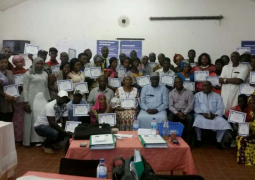Members of the Gambia Chambers of Commerce and Industry (GCCI) in collaboration with various business operators and stakeholders within the ministry of Agriculture recently convened a meeting at the GCCI head office to discuss the national agricultural policy and framework documents, among other related issues, and map out the way forward in the development of agriculture in the country.
Speaking at the meeting, Lamin Dampha, director of Investment and Industry at the ministry of Trade in Banjul, said the forum was a consultation meeting with the private sector to discuss the policy statement on commercialization of the agricultural sector.
The government was seeking budget support from the World Bank to support commercialization of agricultural development in The Gambia.
Therefore, the meeting with business operators was key in the development of agriculture, he said.
“We have some policy statements, and thought it is important to share them with the private sector so that we can have their input before we finalize the policy statements. This is why we convened the meeting in order to solicit inputs from the private sector,” he added.
According to Dampha, they are targeting mainly farmer organizations, and private businesses interested in investing in agricultural development, particularly in the areas of provision of fertilizer and seeds on a commercial basis.
The idea was for government to provide the conducive environment so that the private sector could come in to provide fertilizer and other inputs to farmers in the country.
The private sector has the mandate to participate in the provision of farming inputs so that it would be easier for the farmers, he said.
Ms Sarata Conateh, manager for business development at GCCI, said the forum was for discussing the implementation of a policy statement from the ministry of Agriculture, focusing on agricultural farm inputs and their distribution nationwide.
The aim is for GCCI to mobilize and ensure that the private sector players and operators get involved in the commercialization of agriculture in the country.
The deputy permanent secretary at the ministry of Agriculture, Sherifo Bojang, said the document was a policy document prepared by the ministry of Agriculture and its development partners.
DPS Bojang revealed that it has six components, including the commercialization of provision the agricultural inputs such as fertilizer and seeds.
He said they are working toward Vision 2016, and thanked GCCI for spearheading the forum, which was geared toward mapping the best strategy in the development of national agriculture.





